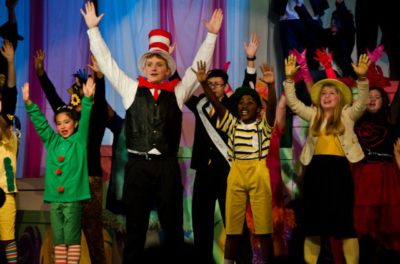 “Mommy made me mash my M&M’s,” trills from the nervous troupe of twenty-five on the stage. Kindergarten to high school, these children are all warming up their voices for this summer’s presentation of “Alice in Wonderland” to be presented at our community theater. It is an all-children production; children will be acting, building sets, running lights and generally spending their summer months of June and July busily learning the art of theater. Wow! It is a whirlwind of creativity and intense focus!
“Mommy made me mash my M&M’s,” trills from the nervous troupe of twenty-five on the stage. Kindergarten to high school, these children are all warming up their voices for this summer’s presentation of “Alice in Wonderland” to be presented at our community theater. It is an all-children production; children will be acting, building sets, running lights and generally spending their summer months of June and July busily learning the art of theater. Wow! It is a whirlwind of creativity and intense focus!
I sit in the seats and watch the artful director as she manages her cast and the chaos about her. She is a natural and is adept at bringing out talent in her students. She is trained. She is skilled. She is volunteering.
Who knows who might be on the stage in front of me; the next Bette Midler (cleverly disguised as the girl who is constantly poking the boy next to her and giggling) or James Dean, who sits nonchalantly at the edge of the stage taking it all in, coolly removed from the preparation of it all and yet, on cue, his voice solos a piece that draws you deeper into the play. Each child is actively discovering and shining their own diamonds in the rough.
I want this moment in my classroom; this theater, this drama, this drawing out of students’ talent. But…and yet…
But, I do not have the skills nor the training to finesse such a dynamic. I can clearly see the skill set the director before me has on display. It is a different type of with-it-ness than what I use in the classroom. It is an odd blend of “more loose” and yet more commanding. She knows how to spatially place her players and what will and will not work onstage. Her visions are grandiose. She makes bold statements of how a scene will play and I think, “What? They can’t do that. It is too complicated.” And yet, as if by the magic of the theater, the action takes almost immediate form on stage. She is skilled and gifted in theater. Neither of these are traits I possess.
And yet, it is clear that our state has fully embraced requiring schools to provide these opportunities for self-expression in the form of theater, dance, music, and the visual arts. As of 2017, we have adopted new Arts Learning Standards. These standards are being assessed in-district, using OSPI developed assessments. As a school, we recently completed a school accountability survey set forth by the Office Superintendent of Public Instruction of what we are currently offering our students in the Arts. How many hours are we providing per week? Who is providing the instruction? As a staff, in a small rural school, we often have to be very creative in how we make these experiences happen for our students.
Should schools require the arts to be taught in school? YES! According to the Dana Foundation, the Arts increases attention skills, spatial skills and motivation. Not only do these contribute to an increase in reading and math test scores, they impact a person’s entire life beyond academics. The ability to pay attention, to see connections in space relative to themselves or between concepts, and a desire to go and do? These are basic foundational needs that all learners need in order to be successful in their lives beyond school.
Should the state provide funding for teaching the arts? YES! Currently, there is not funding allocated specifically for the instruction of the Arts at the elementary school level. Our school supports our Arts Program through fundraising and grant writing. These tasks are often placed on the shoulders of our staff. Both of these are time-intensive tasks that take away from the education of students. It should not be this way.
Why do the Arts even matter? The answer to this could – and has – filled many a book. For me, on this sunny summer morning, the answer is in the awkward teen whose entire demeanor changes as he sets foot on the stage – shoulders lifted, a broad smile; he is in his element. His voice rolls forth in a solid sound, “Mommy made me mash my M&M’s!” So silly…so freeing…so theatrical! His face is one of newly found confidence; a new found self.
The power of art to not only to express who you are, but to learn who you are.